The Match Factory Girl (1990): revancha en los suburbios | revenge in the suburbs
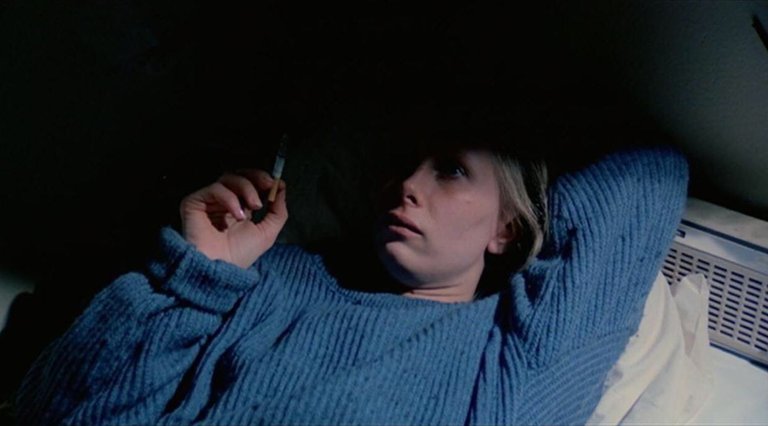
There are many good film directors and everyone can choose their favourites for one reason or another, but in such a large cinematic universe in which there are countless similar products, it's a plus to find the work of a director with his own stamp. The films of Bergman, Kurosawa, Tarantino, Villeneuve, Farhadi, to name just a few, are easily identifiable and distinguishable from the rest. And the same goes for the films of the Finnish director Aki Kaurismäki.
Hay muchos buenos directores de cine y cada quien puede escoger sus favoritos por una u otra razón, pero en un universo cinematográfico tan grande en el que existen infinidad de productos parecidos, es un punto a favor dar con la obra de un director con sello propio. Las películas de Bergman, Kurosawa, Tarantino, Villeneuve, Farhadi, por nombrar sólo algunos, son fácilmente identificables y diferenciables del resto. Y lo mismo ocurre con las películas del finlandés Aki Kaurismäki.
Written by the director himself, Tulitikkutehtaan tyttö (The Match Factory Girl) is a psychological drama, not without a certain black humor, which together with Varjoja paratiisissa (Shadows in Paradise) and Ariel, is part of what is known as The Proletariat Trilogy, independent stories that have common elements in the context and the characters. To be fair, this would be one of those rare trilogies of four stories because Kuolleet Lehdet (Fallen Leaves), Kaurismäki's most recent film, also follows the same vein, but until last year, the trilogy ended with The Match Factory Girl. The film tells the story of Iris, a young woman (how young? I'm not sure) with a solitary and somewhat taciturn character, who lives with her mother and her new partner (the girl's father left, or was thrown out, we don't know, but the truth is that her real father doesn't live with her) and who leads a mediocre, routine and proletarian life. She leaves home to work in the factory of the title where she does mechanical work for several days a week and her only entertainment is going to a dance hall where she's not always lucky enough to be invited to the dance floor and she sits watching the others dance while drinking one glass of juice after another. And so the weeks go by, between her house, the factory and the hall, with some time in between to read a romantic novel while traveling by bus through the city.
Escrita por el propio director, Tulitikkutehtaan tyttö (The Match Factory Girl) es un drama psicológico, no exento de cierto humor negro, que junto a Varjoja paratiisissa (Shadows in Paradise) y Ariel, forma parte de lo que se conoce como la trilogía del proletariado, historias independientes que poseen elementos comunes en el contexto y en los personajes. Siendo justos, esta sería una de esas raras trilogías de cuatro historias porque Kuolleet Lehdet (Fallen Leaves), la película más reciente de Kaurismäki, también va en la misma línea, pero hasta el año pasado, la trilogía acababa con The Match Factory Girl. En el film se cuenta la historia de Iris, una joven (pero, ¿qué tan joven? no me queda muy claro) con un carácter solitario y algo taciturno, que vive con su madre y con la nueva pareja de ella (el padre de la chica se marchó, o lo botaron, no se sabe, pero lo cierto es que su verdadero padre no vive con ella) y que lleva una vida mediocre, rutinaria y proletaria. Sale de casa para trabajar en la fábrica del título en donde hace un trabajo mecánico durante varios días a la semana y su única diversión es ir a un salón de baile en el que no siempre corre con la suerte de que alguien la invite a la pista y se queda sentada viendo a los otros bailar mientras se toma un vaso de jugo tras otro. Y así transcurren las semanas, entre su casa, la fábrica y el salón, con algunos espacios entremedio para leer alguna novela romántica mientras se desplaza en bus por la ciudad.
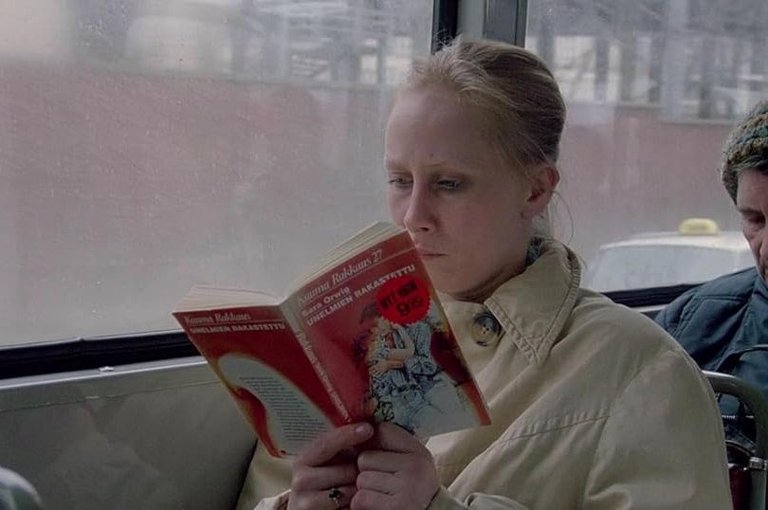
As in other stories by the Finnish director, here we also find characters who are sparse in words. For most of the film, Iris, her mother, her stepfather, and many others, remain completely silent and in those moments the dialogue is established by the environment, the ambient noise, the radio, a band playing a song on a stage or the television showing the most relevant news of the moment and which - as in almost any time - are not at all encouraging. Wars, violent clashes between one group and another, are the headlines that parade before the eyes of Iris's mother and her partner, who don't seem to be fazed by anything.
Como en otras historias del director finlandés, acá también nos encontramos con personajes parcos en palabras. Durante la mayor parte de la película, Iris, su madre, su padrastro, y muchos otros, se mantienen en absoluto mutismo y en esos momentos el diálogo lo establece el entorno, los ruidos de ambiente, la radio, una banda que toca una canción en un escenario o el televisor que muestra las noticias más relevantes del momento y que - como casi en cualquier época - no son nada alentadoras. Guerras, enfrentamientos violentos entre un grupo y otro, son los titulares que desfilan frente a los ojos de la madre de Iris y de su pareja, quienes no parecen inmutarse ante nada.
That is part of the charm of Kaurismäki and his characters; they manage to communicate emotions, ideas, thoughts and projects with only glances, gestures and attitudes. With a body posture, a lost look, the slowness in lighting a cigarette, with the way they take or leave an object on the table, the characters show us if they are happy, upset, sad, jealous or frustrated. It's not necessary to add a conversation inside Iris's house for us to realize that her mother is not very affectionate with her, that her stepfather doesn't have much esteem for her either and that the outings to the ballroom are the escape that Iris has to abstract herself from that accompanied loneliness in which she lives at home and from that mechanized work that - as Chaplin has been denouncing since his iconic Modern Times - can greatly affect a person's character. Added to this are dirty and dark streets, cracked walls, old and cracked doors, and bars, to create a world common to the world's working class. Wherever you live, if you are or have been part of the proletariat, the working class, the poor class, you can identify with that lifestyle that modernity has not managed to eradicate. However, despite this atmosphere, Kaurismäki's films are not depressing, and I think that is due to two important factors: the cinematography and the sense of humor.
Eso es parte del encanto de Kaurismäki y de sus personajes, logran comunicar emociones, ideas, pensamientos y proyectos con sólo miradas, gestos y actitudes. Con una postura corporal, una mirada perdida, la lentitud al encender un cigarrillo, con la forma en que se toma o se deja un objeto sobre la mesa, los personajes nos muestran si están felices, molestos, tristes, celosos o frustrados. No hace falta que se agregue una convesación dentro de la casa de Iris para que nos demos cuenta de que su madre no es muy cariñosa con ella, que su padrastro tampoco le tiene gran estima y que las salidas al salón de baile son el escape que tiene Iris para abstraerse de esa soledad acompañada en la que vive en casa y de ese trabajo tan mecanizado que - como lo viene deunciando Chaplin desde su icónica Modern Times - puede afectar enormemente el carácter de una persona. A ese conjunto se le suman calles sucias y oscuras, paredes agrietadas, puertas viejas y resquebrajadas, bares, para configurar un mundo común a la clase obrera mundial. Vivas en donde vivas, si eres o has sido parte del proletariado, de la fuerza obrera, de la clase pobre, puedes identificarte con ese estilo de vida que la modernidad no ha logrado erradicar. Sin embargo, a pesar de esta atmósfera, las películas de Kaurismäki no son deprimentes y eso creo que se debe a dos factores importantes: la fotografía y el sentido del humor.

There are scenes or frames in each of the films I've seen from this director that possess great aesthetic beauty. It makes you want to pause the film or print the scene and display it in a photo exhibition. The colours, the textures, the play of light, everything is very well thought out and executed in each scene and this visual delight is essential in a film that forces you to observe what the characters do rather than listen to what they say.
Hay escenas o cuadros de cada una de las películas que he visto de este director que poseen gran belleza estética. Dan ganas de pausar la película o de imprimir la escena y exhibirla en una exposición fotográfica. Los colores, las texturas, los juegos de luces, todo está muy bien pensado y ejecutado en cada escena y ese deleite visual es imprescindible en una película que te obliga a observar lo que los personajes hacen más que a escuchar lo que dicen.
And the sense of humor is also crucial. An object here, a few lines of dialogue there, a sudden gesture, all of which help the seriousness of the story to relax a bit and not be overwhelmed by the sparseness of the dialogue or the rusty spaces. In The Match Factory Girl there's a little less humor than in the director's other works, but it's much darker. Seeing how Iris suddenly decides to take some kind of revenge against all those who have oppressed her in some way and expresses so many repressed feelings through irreversible actions is somewhat funny because of the way she does it and the satisfied expression on her face. Kati Outinen, a frequent collaborator of Kaurismäki whom I had already seen in The Man Without a Past, plays Iris very well and doesn't need to say many things for us to understand her and feel a certain sympathy for her. I know that the Finnish director is not very well known in this part of the world, but in case anyone knows him, have you seen this film? Have you seen any other Kaurismäki films? I'll read you in the comments.
Y lo del sentido del humor también es crucial. Algún objeto aquí, unas pocas líneas de diálogo por allá, un gesto repentino, hacen que la seriedad de la historia se distienda un poco y que no nos agobie la parquedad de los diálogos ni lo herrumbroso de los espacios. En The Match Factory Girl hay un poco menos de humor que en otras obras del director, pero es mucho más oscuro. Ver cómo de un momento a otro Iris decide tomar una especie de venganza contra todos los que la han orpimido de alguna manera y expresa tantos sentimientos reprimidos a través de acciones irreversibles tiene algo de gracioso por la forma en que lo hace y por la expresión de su rostro satisfecho. Kati Outinen, asidua colaboradora de Kaurismäki a quien ya había visto en The Man Without a Past, interpreta a Iris de gran manera y no necesita decir muchas cosas para que la entendamos y sintamos cierta simpatía por ella. Sé que el director finlandés no es muy conocido de este lado del mundo, pero en caso de que alguien lo conozca, ¿vieron esta película? ¿han visto alguna otra película de Kaurismäki? Los leo en los comentarios.
Reseñado por @cristiancaicedo
Other posts that may interest you | Otros posts que pueden interesarte:
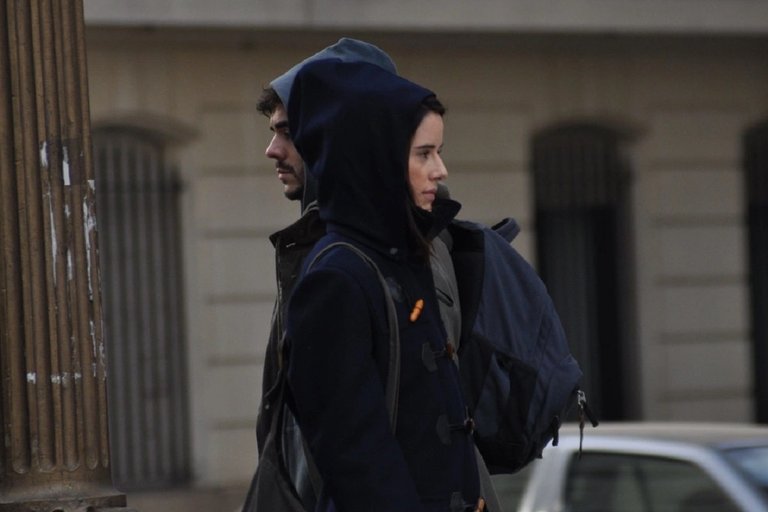   |
|---|
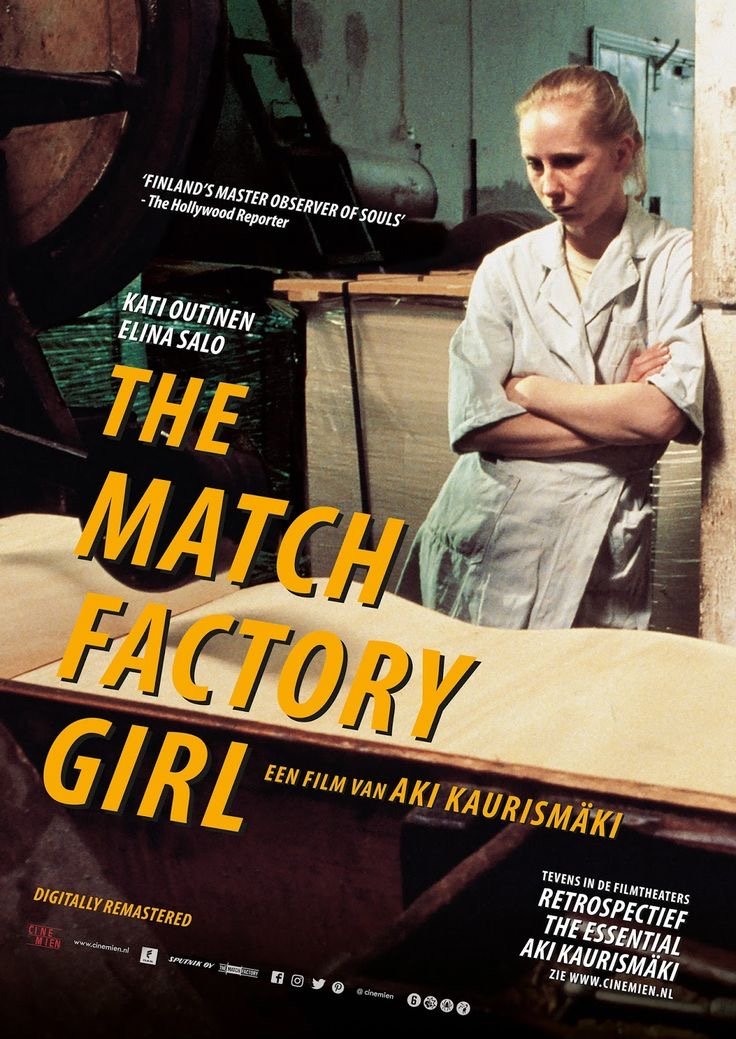


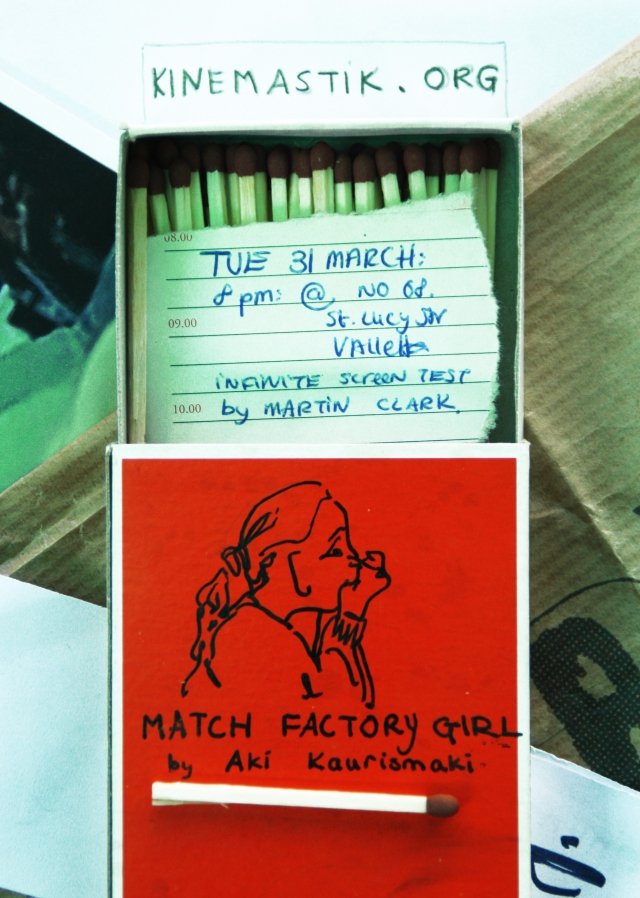
La forma en que los personajes expresan sus emociones a través de gestos y miradas es realmente fascinante. También me parece interesante el contraste entre el humor negro y la seriedad de la trama, lo que le añade una capa extra a la historia de Iris. Muy buena,